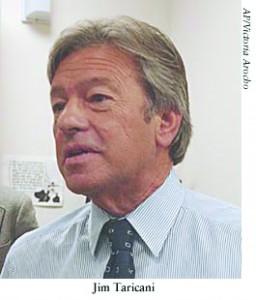 Jim Taricani is a retired investigative reporter, well known for his work at WJAR NBC 10, where he founded the station’s I-Team. He was sentenced to six months of home confinement for refusing a court order to divulge a source related to his work on the federal investigation into then PVD mayor Buddy Cianci.
Jim Taricani is a retired investigative reporter, well known for his work at WJAR NBC 10, where he founded the station’s I-Team. He was sentenced to six months of home confinement for refusing a court order to divulge a source related to his work on the federal investigation into then PVD mayor Buddy Cianci.
Throughout his career, Taricani created a distinct brand of broadcast investigative reporting and, along with late Pulitzer Prize winner Jack White, is the standard-bearer for investigative television journalism in the southern New England market, and a nationally respected broadcaster.
The below is a portion of an in-depth conversation I had with Taricani on The Bartholomewtown Podcast. This section discusses part of Mr. Taricani’s experience with the federal investigation into Cianci.
Jim Taricani: Cianci. It was the same FBI agent, Dennis Aiken, who was the head of the investigation for “Cianci 1” that was the head for “Cianci 2,” and I got to know him fairly well.
He put the cases together. I think Lincoln Almond was US attorney at the time and I think they put a total of about 22 members of the Cianci administration in jail, but they could never get Buddy. I remember years later, I was sitting in the newsroom [at channel 10] and the receptionist called me and he said, “There’s a Dennis Aiken here to see you.” I hadn’t heard from him in years, and I went out there to the reception area and I said, “Hey, what’s going on?” He said, “We’re here to get Buddy Cianci,” and I sat down with him and he kind of outlined what the FBI intended to do, off the record. That’s how I heard about Plunder Dome.
Bill Bartholomew: Was that far out in advance that they had been working on this case?
JT: Yeah. But by the time he saw me, I think they had been about a year into it. And then one day he called me up, maybe a year later, something like that. He said, “I want to show you something.” I met him over at the Newport Creamery in Garden City; our station was over by that way. We sat down and got a cup of coffee and he pulls out an 8×11 manila envelope and takes out a still picture of Cianci’s right-hand man, Frank Corrente, putting $1,000 worth of cash in his desk drawer from Tony Freitas, the cooperating witness. And I said, “Wow.” He says, “We’re going to get Buddy, we’re going to get him this time.” Dennis was a source of mine throughout the whole thing, and I’m pretty sure for other reporters in the market. And then, eventually, they did indict Buddy.
I got jammed up in that case because I aired a tape I had from the FBI. I was sentenced to six months home confinement by a federal judge and it was actually Dennis Aiken who did me in on that. So our relationship as a reporter-source-almost-friend fell apart for sure.
BB: Yeah. Let’s talk about that scenario. Your refusal to disclose your source stands as one of the most incredible moments that a person has to truly prove how authentic they are. I take so much inspiration from that moment personally, way before I ever had an interest in journalism. Just as an artist — the integrity that you possessed there.
JT: Well, I believe any journalist would do the same thing. Any good journalist would do the same thing. And what happened was the day of my contempt hearing; the case had gone on for quite some time. I was sitting in Au Bon Pain, a coffee shop in Providence, because my lawyer’s office was upstairs from that, and Dennis Aiken came in and he sat down and he says, “Look, do me a favor before you go over to the courthouse. If I give you an affidavit to sign waiving any privilege we had, will you sign it in the state for the record that I was not your source?” Because he wasn’t. I said, “Geez, no, Dennis. I can’t do that.”
I said, “The prosecutors would know right away that it was kind of an unsavory thing to do,” because during my depositions, when I was being investigated, an old trick of special prosecutors, which I had known, was to throw out an affidavit signed by somebody who actually was “my source,” you know, saying, “I give Jim permission to talk about anything he wants.” Of course, I ignored that.
I had to say, “No, I’m not going to talk about it.” I didn’t name who my source was. I didn’t even think of it. Aiken went over and talked to the special prosecutor and told them that I wouldn’t sign his affidavit, and I’ll never forgive him for that. It was so hypocritical because he was leaking me information throughout Plunder Dome. I’m almost positive to other reporters, too. I wouldn’t ever ask about it, but I’m pretty sure that’s what happened. They called me into court, I still refused to give up my source and they sent it to me to six months home confinement. [I avoided prison] mostly because of my heart transplant. My doctor wrote Judge Torres and said, “Look, he shouldn’t be around a prison situation because of his immune system. You know, you’re taking a big risk by putting him there.” So, the judge was at least, in that sense, kind enough to put me on home confinement instead of a prison.
To listen to the complete episode of The Bartholomewtown Podcast featuring Jim Taricani, visit bartholomewtown.com